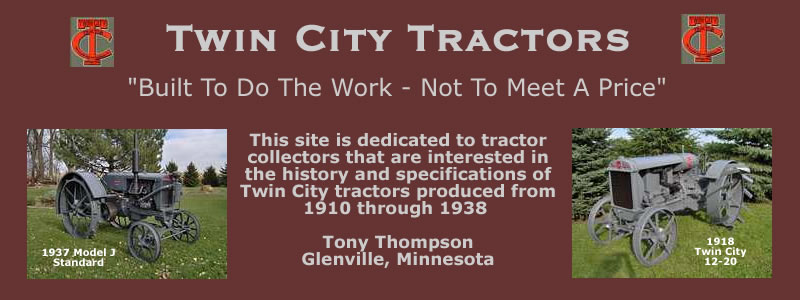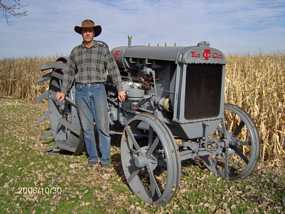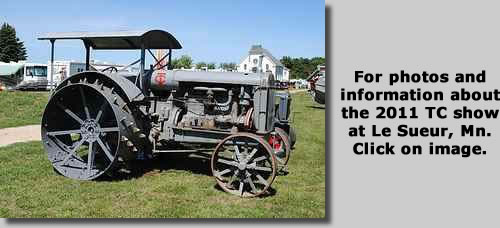 |
||||
MINNEAPOLIS STEEL & MACHINERY COMPANY |
||||
1902 to 1929 |
||||
Formed in 1902, Minneapolis Steel & Machinery Company provided structural steel for building bridges, water towers, and flour mills for Minnesota’s largest city, Minneapolis-St. Paul, also known as the Twin Cities. MS&MC was also a contract manufacturer and engine supplier for several other businesses. Between 1909 and the mid-teen’s MS&MC supplied tractor engines for Reeves & Company, manufactured the 30-60 Case and the Bull tractors. In 1910 MS&MC worked with McVicker Engineering to develop the first of an impressive line of durable heavyweight gas tractors known as Twin City. A 15-30, 25-45, 40-65, and a 14 ton six cylinder 60-90 rounded out the heavyweight line-up. In 1914 the Twin City Twentieth Century tractor was produced for the Canadian market and was followed by an automotive styled 16-30. World War I put an end to outside contracts and the company concentrated on military munitions and continued development of a smaller tractor program. One of the most significant developments in Twin City history was the release of the 12-20 in 1918. This 5,000 lb 340 ci., twin cam, sixteen valve, in-line engine, unit frame tractor had a fully enclosed transmission and final drive running in oil. This advanced machine may have been on the drawing board as early as 1916. At that time nearly all other manufacturers made tractors with open gears mounted on basic channel frames. Twin City also entered motor truck production in 1919 with a 2 ton and 3 ½ ton. MS&MC did not mass produce cheaply engineered tractors affordable to the small farmer. These machines were subject to severe duty, turning over vast sections of virgin prairie, building and maintaining thousands of miles of new roads for America’s rapidly developing Twentieth Century. Twin City earned a solid, global reputation through world wide distribution and strategic dealer networks. Full service branch houses claimed their products were “Built to do the work – not to meet a price”. The successful 12-20 was copied in a “twice the size” 20-35 by 1920. This pair was grossly underrated and by 1926 they would become the 17-28 and 27-44 with virtually no changes in design. With the heavyweight line now out of production, a mid-sized 21-32 was added. MS&MC survived the Depression following the war, however, with all this hard-earned success; there was still one glaring omission. The company did not offer a line of tillage implements. John Deere had an impressive line of tillage tools and began production of a general purpose tractor. Massey Harris, Case, and Allis Chalmers had expanded into full line suppliers. International Harvester emerged as the dominant manufacturer after a favorable termination of Fordson in the famous price wars. Competition was fierce among leading manufacturers. In an effort to ensure their survival, and become a full line supplier, MS&MC organized a merger in the spring of 1929, blending inventory and tooling with Moline Plow Company and Minneapolis Threshing Machine Company to become Minneapolis Moline Power Implement Company. Released just before the merger, the last models designed by Minneapolis Steel & Machinery Co. were the KT and MT. Minneapolis Moline assembled these Twin City tractors from 1929 through 1938, labeling many of them as MM-Twin City. |
||||
 |
Click on your favorite Twin City area of interest below |
|||
| Questions and comments email me at loveoldjunk@gmail.com | ||||
© Pioneer Productions |
||||
